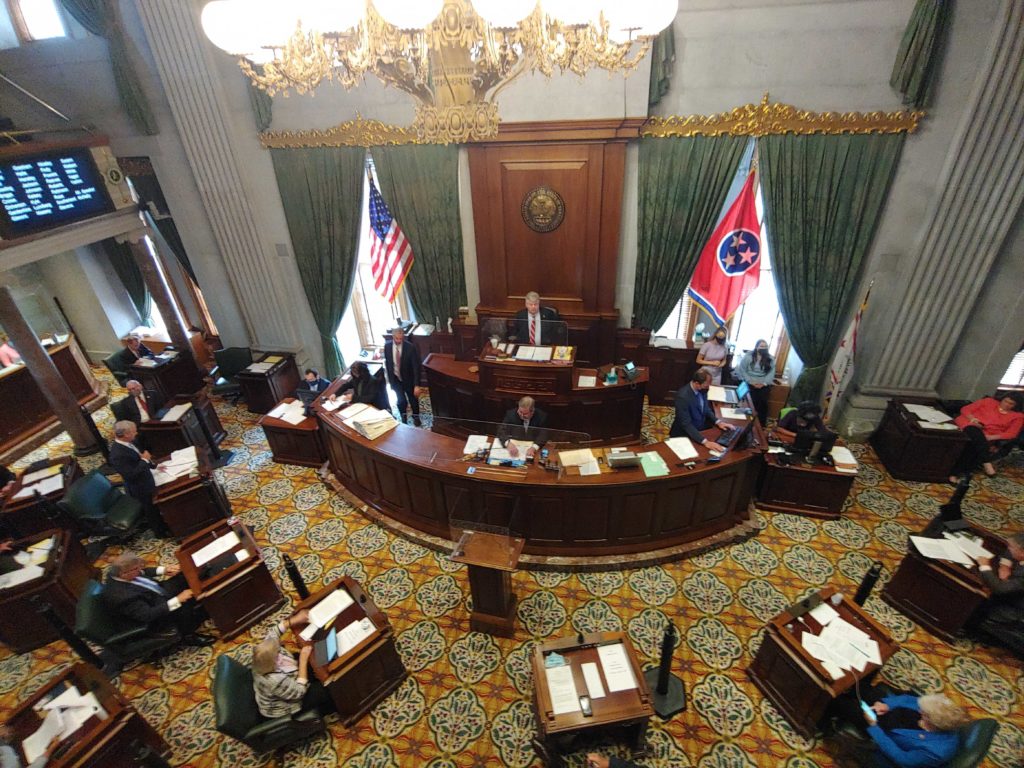
A measure backed by Gov. Bill Lee that sets new sentences for protesting — including making it a felony to stay overnight on state property — has passed the Tennessee General Assembly.
It’s now headed to Lee’s desk after being approved Wednesday night by the Republican-led legislature.
The bill comes in response to ongoing overnight protests against a bust of Confederate General and early Ku Klux Klan leader Nathan Bedford Forrest. State troopers have repeatedly arrested the few dozen demonstrators gathered outside the Tennessee State Capitol but have not succeeded in getting the protesters to disperse.
Camping on state property without authorization has been made a crime since the Occupy Wall Street movement nearly a decade ago. The Tennessee Senate favored simply adding a requirement to pay restitution and clean up any mess that was made. But House lawmakers insisted on making camping on public property a Class E felony, with up to six years in prison.
Sen. Mike Bell, R-Riceville, and other Republican and Democratic lawmakers raised issues with that provision as a whole, claiming that it was confusing and would criminalize a family laying down a blanket at state property.
Earlier in the day, Bell had warned about the charges sticking to “some young passionate person who made a mistake” and ends up charged with a felony. Democrats noted that would mean the loss of their voting rights.
Well, camping on state property will now lead to felony punished by range of 1 to 6 years in prison and up to a $3,000 fine.
And bonus penalty for exercising your protest rights in an unapproved manner: you lose your voting rights.
— Jeff Yarbro (@yarbro) August 12, 2020
According to the final version, camping means laying down a blanket, sleeping bag or any other bedding material, or erecting a tent or a canopy from 10 p.m. to 7 a.m. Those who violate the provisions would have to spend at least 12 hours in jail without bond.
Supporters of the law said law enforcement agencies still have the discretion to make a decision whether to arrest and charge someone. The measure also enhances penalties for assaulting law enforcement.
Throughout the debate, Republicans also kept bringing up the potential for violence and rioting, but they did not make clear how camping on state property is a show of violence.
“You can’t protest and riot. Those are two different things,” said bill sponsor Sen. John Stevens, R-Huntingdon. “Violence, intimidation, threats are not allowed in our system.”
Republican lawmakers did draw the line at one provision. Originally, the measure would have authorized the Tennessee Attorney General to overrule local prosecutors if they chose not to pursue charges. But lawmakers dropped that language.
Demonstrators arrested
As lawmakers debated the final wording, protesters chained themselves to a guard rail on Capitol Hill with handcuffs wrapped in thick layers of duct tape. Before midnight, state troopers used bolt cutters to remove and arrest 16 demonstrators.
Jonelle Christopher had already been arrested three times since joining the group more than 60 days ago. As other handcuffed protesters clanged on the fence in the background, she said she’ll keep finding new ways to put pressure on officials.
“We will take action against these laws that they’re making to try to further criminalize us and put these things on our records that are untrue — saying that we’re trespassers and vandals. I think that we’re just citizens that want to fight for our rights and the everyday rights of all Black and brown Americans.”
Christopher says the group could have to shift gears.
By Thursday morning, defense attorneys indicated all who were arrested would soon be released. Charges of resisting arrest were denied in overnight court hearings, leaving demonstrators with counts of trespassing.
Sen. Brenda Gilmore, D-Nashville, opposed the measure. She warned her colleagues about the law’s impact and that it could show the legislature was “on the wrong side of history.” Gilmore said this measure will squash people’s First Amendment rights to free speech, peaceful assembly and to petition their leaders to address grievances.
“The majority of these protesters have been peaceful,” Gilmore said in a committee discussion. “90% of those kids are young kids, 90% are white kids. This protest and this movement is different than the one in the ’60s.”
The measure will become effective upon being signed into law.
Update: This story has been updated to include information on arrests made Wednesday night at the capitol.

